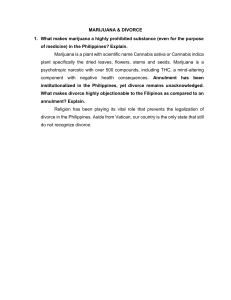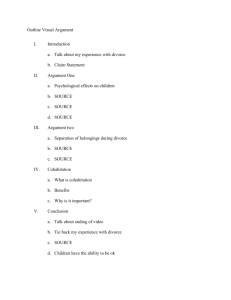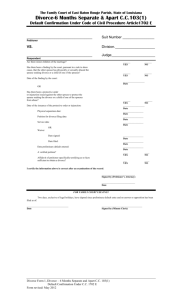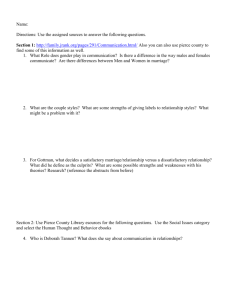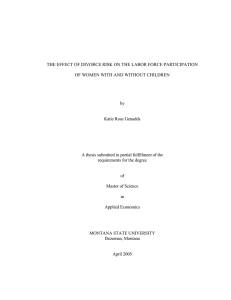Research Paper – Research & Outline On Friday you will turn in: 1
advertisement
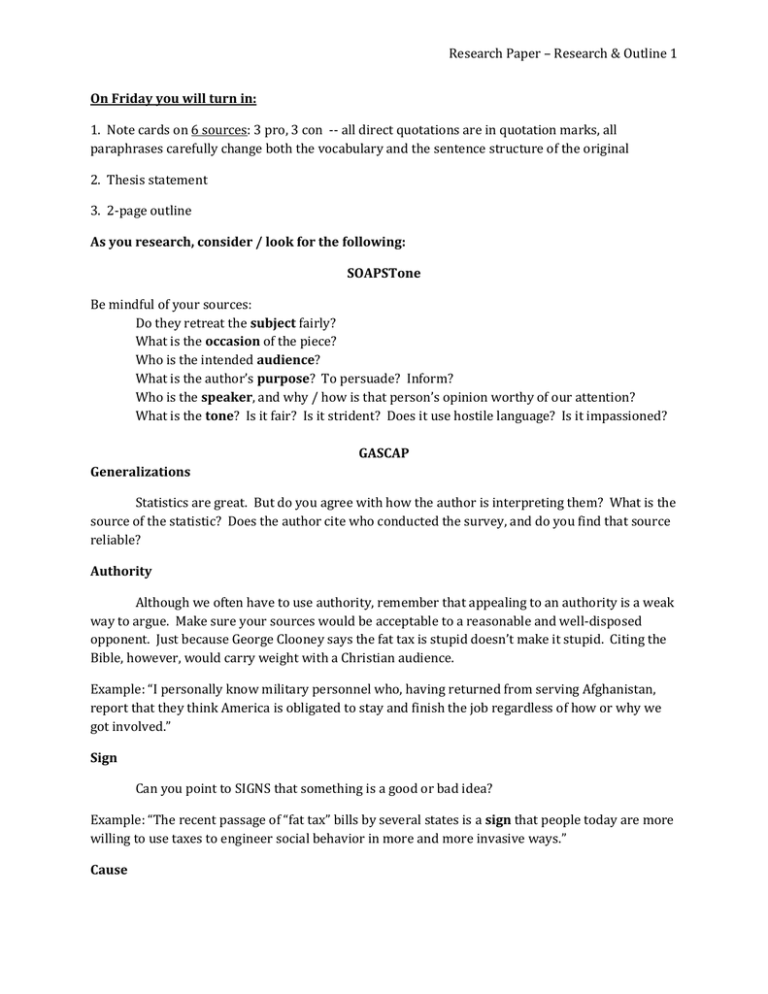
Research Paper – Research & Outline 1 On Friday you will turn in: 1. Note cards on 6 sources: 3 pro, 3 con -- all direct quotations are in quotation marks, all paraphrases carefully change both the vocabulary and the sentence structure of the original 2. Thesis statement 3. 2-page outline As you research, consider / look for the following: SOAPSTone Be mindful of your sources: Do they retreat the subject fairly? What is the occasion of the piece? Who is the intended audience? What is the author’s purpose? To persuade? Inform? Who is the speaker, and why / how is that person’s opinion worthy of our attention? What is the tone? Is it fair? Is it strident? Does it use hostile language? Is it impassioned? GASCAP Generalizations Statistics are great. But do you agree with how the author is interpreting them? What is the source of the statistic? Does the author cite who conducted the survey, and do you find that source reliable? Authority Although we often have to use authority, remember that appealing to an authority is a weak way to argue. Make sure your sources would be acceptable to a reasonable and well-disposed opponent. Just because George Clooney says the fat tax is stupid doesn’t make it stupid. Citing the Bible, however, would carry weight with a Christian audience. Example: “I personally know military personnel who, having returned from serving Afghanistan, report that they think America is obligated to stay and finish the job regardless of how or why we got involved.” Sign Can you point to SIGNS that something is a good or bad idea? Example: “The recent passage of “fat tax” bills by several states is a sign that people today are more willing to use taxes to engineer social behavior in more and more invasive ways.” Cause Research Paper – Research & Outline 2 Can you argue that the effects of a decision will be negative? Can you question whether something really does cause something else? Have you gotten sources that consider the unintended consequences? Examples: “Fat tax laws hurt businesses that provide other important services to society.” “No-fault divorce has led to an increase in divorce in society.” “Dating in high-school is strongly correlated to a higher rate of emotional distress among young people.” Analogy Can you use an analogy to explain yourself, or to create an argument? Example: “Cheerleading is not considered a sport; but legally, golf is not considered a sport either.” “A prohibition on cigarettes would likely have a fate similar to the 1920’s prohibition on alcohol.” Principle As you sort through all these opinions and sources, you may struggle to take a stand. Both sides are so convincing, right? But remember what you believe most fundamentally: What are the principles that you think need to be brought to bear on this question or issue? What are the principles that you see at play; which do you agree with, which do you not agree with? What political principles do you bring to this discussion? (If you consider yourself a member of a particular political party, what principles does that party hold and how do they apply?) What practical principles do you bring to this discussion? Ex: What should be the purpose of dating? What should children be doing with the time they spend on social networking sites? What moral principles do you bring to this discussion? What are the four qualities of a just war? What moral principles does an informed Catholic / Christian bring to the table about this issue? What are our obligations to animals? To children? To our fellow-citizens? What are the demands of justice in this situation? Of compassion? Of wisdom? Finally, how do we balance principles against each other? For example: which is more important—the good of advancing medical research, or the good of respecting the dignity of the human person? Which is more important, the good of advancing medical research, or the good of not causing animals needless pain or harm? If your topic leads you into deep questions, I hope that you move forward thoughtfully, wisely, prayerfully. A Derek Young pointed out to us a few weeks ago, it is a wisdom for young people to seek guidance from older / wiser people in difficult matters. Research Paper – Research & Outline 3 Fallacies Be careful not to fall into these, and feel free to point them out where you find them! Bandwagon – “everybody’s doing it” Ad Hominem / Personal Attack Ad Populum – appeal to irrational prejudice or fear Red Herring / Tangent Begging the Question / Complex Question – assuming what you’re trying to show Either / Or thinking / False Dilemma / False Dichotomy – are there really only two options…? Straw Man – putting stupid words into your opponent’s mouth and then refuting that Post Hoc Ergo Propter Hoc – “after this, therefore because of this” Appeal to Untrustworthy Authority Using Bad Data Wrong “Facts” Half-Truths Inappropriate Appeal to Emotions of Pity, Fear, Anger, Use of Ridicule, Spite, Contempt, Mockery Misleading Vividness – This is one or two really startling examples make more of a claim than they should; for example, plane crashes are really shocking and frightening… but it’s actually safer to fly than drive Spotlight – When a few highlighted cases are made to stand for a whole group (e.g., rude and angry pro-life demonstrators are shown on TV; people then assume all pro-life people are rude and mean) Research Paper – Research & Outline 4 As you write your outline, consider: Modes of Development Description Is there a situation or a problem that you want to describe? Definition What key terms do you need to define? Everybody will have at least one. How and where are you going to define it in your paper? Example: vegetarianism; social media; marriage Exemplification Examples are an excellent way to explain yourself and add interest to your story. What is an example of a situation that you would like to see avoided? That would be good to see happen? Narration There is a back-story to many of these topics. Tell that story. How did America get involved in Afghanistan in the first place? What happened in California with Prop 8? And so on… Cause and Effect Analysis What are the material causes and effects of X? What is the formal cause of X? Who or what can, or will, or did cause X to happen? What is the purpose of X? What are / could be / have been the unintended consequences of X? What are other possible causes of X? Division / Analysis / Classification Do you need to divide something up into parts or kinds or categories? For example: Are there different kinds of fat taxes? Are there different kinds of smoking bans? How does the medical use of marijuana differ from the recreational? What are the different reasons for dating? What are the different kinds of social media that are out there? Are there different kinds of objections to your position? What are the different kinds of divorce? What are the different kinds of vegetarianism? Process Analysis Are there any processes that need to be explained? For example: How does a law get passed? How does somebody get a divorce now (vs. before no-fault divorce)? What happens to the nerve synapses in a young boy’s brain after he has been playing video games for 6 hours? What are the effects of marijuana on the brain? What happens in animal testing? Compare and Contrast It’s basically using an analogy. It can be a brief metaphor, or it can be an extended analysis comparing the effects of marijuana to those of alcohol, the start of the war in Afghanistan and the start of the war in Korea, cohabitation vs. marriage.
